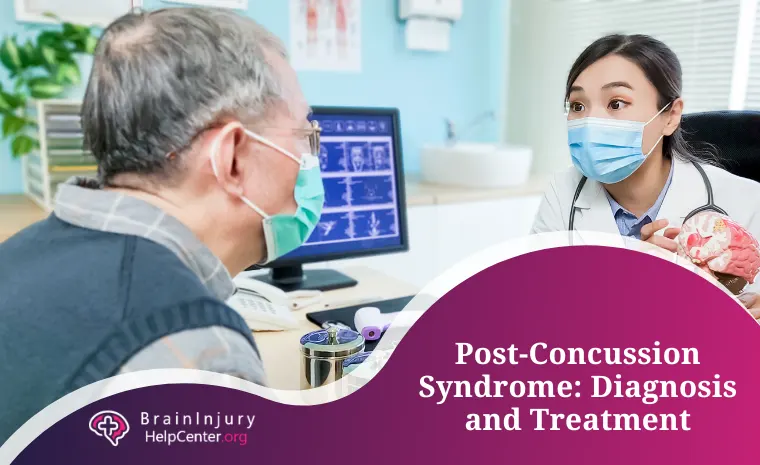Are you experiencing frequent headaches, lack of focus or trouble sleeping, lapses in memory, and dizziness following an accident or blow to the head? These symptoms could be signs of post-concussion syndrome. Don’t suffer in silence — seek medical help for the best chance to recover!
In this article, we will explain in detail the causes, diagnosis, and treatment options available so that you can better understand how to manage your condition and get back to feeling like yourself again.
Definition & Causes
Traumatic Brain Injury (TBI) is a significant public health issue. It occurs in all age groups across the United States at an estimated rate of 1.5 million cases per annum and costs approximately $17 billion annually, with 75% of cases classified as mild.

Post-Concussion Syndrome (PCS) is a constellation of physical, cognitive, behavioral, and emotional symptoms experienced after TBI that may persist past three months in some cases. Studies have revealed that even a mild traumatic brain injury (TBI) with persistent concussion-like symptoms can cause lasting impairments to one’s memory, executive functioning, and learning capability. Furthermore, the same individual is more likely to experience these issues if they suffer from multiple episodes of TBI.
Some of the most common symptoms of PCS include:
- Headaches
- Fatigue
- Dizziness
- Vision changes
- Disturbances in balance
- Confusion
- Insomnia
- Difficulty concentrating and cognitive deficits
- Neuropsychiatric symptoms, such as anxiety, depression, and irritability.
The exact causes of PCS are not fully understood, but researchers have identified several factors that may contribute to the development and persistence of symptoms. One of the main underlying causes of PCS is the physical injury to the brain that occurs during a concussion.
In addition to direct physical injury, inflammation and chemical changes in the brain can also contribute to the development of PCS. When the brain is injured, it triggers an immune response that can cause inflammation and cell damage. This can lead to a cascade of events that disrupt the brain’s normal functioning.
Other potential factors contributing to the development of PCS include genetic predisposition, pre-existing health conditions, and psychological factors such as stress and anxiety. For example, individuals with a history of depression or anxiety may be more likely to develop PCS after a concussion.
Recognizing and understanding the underlying causes of PCS is crucial for the effective treatment and management of the condition. By identifying the specific factors contributing to a person’s symptoms, healthcare providers can develop a personalized treatment plan that targets the root causes of PCS.
Symptoms to Solutions: How to Identify and Diagnose PCS
As mentioned, during a concussion, the brain is jolted or shaken, causing a disruption in normal function. This can lead to a variety of symptoms such as headaches, dizziness, and confusion. Once these symptoms are persisting, this can lead the victim to a PCS.
To diagnose PCS, professionals perform the following:
- Medical history: The first step in diagnosing PCS is to take a detailed medical history. This includes asking about the individual’s injury, the symptoms they are experiencing, and any other medical conditions they may have.
- Physical exam: A physical exam will be performed to check for any physical signs of a concussion, such as changes in balance, coordination, or reflexes.
- Neurological exam: A neurological exam will be performed to assess brain function, including tests of memory, attention, and other cognitive abilities.
- Diagnostic tests: Imaging tests, such as a CT scan or MRI, may be ordered to rule out other conditions that could be causing the symptoms.
- Symptom tracking: To help with the diagnosis, the individual may be asked to keep a symptom diary, tracking the duration and severity of their symptoms.
- Assessment of symptom persistence: PCS is typically diagnosed if symptoms persist for several weeks or longer after the initial injury.
- Referral to a specialist: In some cases, a referral to a specialist, such as a neurologist or a neuropsychologist, may be necessary to confirm the diagnosis and develop a treatment plan.
It’s worth noting that there is no definitive test for post-concussion syndrome, and the diagnosis is typically made based on the individual’s symptoms and medical history.
Treatment for Post-Concussion Syndrome
Treatment for PCS typically consists of cognitive behavioral therapy, medication management, and lifestyle modifications. Cognitive behavioral therapy is used to help an individual identify and modify anxious thoughts and behavior patterns related to their experience with the injury. Medications such as antidepressants may also be prescribed to reduce anxiety and depression, as well as help improve sleep quality.
Lifestyle modifications are also important for PCS as they may include proper rest and relaxation techniques, stress management strategies, healthy diet changes, regular physical activity, and avoiding high-risk activities that could cause further injury.
Coping with PCS
Victims of Traumatic Brain Injury (TBI) face difficulties managing the physical and emotional effects of their injury. When mild TBI evolves into a problematic post-concussion syndrome, increased effort is needed to manage symptoms and progress toward recovery.
The following tips may prove beneficial:
- Follow a healthy diet and exercise routine – Eating nutritious meals and staying active can help improve your mental health and mood.
- Stay connected with friends and loved ones – Talking to family, friends, or a therapist can help you stay connected and break the feeling of isolation that PCS often causes.
- Practice self-care techniques – Doing activities such as yoga, meditation, or taking a hot bath can help reduce stress levels associated with PCS symptoms.
- Get plenty of rest – Many people with PCS struggle to get enough restful sleep due to the symptoms they are experiencing. Practicing healthy sleep hygiene habits such as avoiding caffeine late in the day can help promote quality sleep.
- Seek professional help if needed – If your symptoms persist for longer than a few weeks or become more intense, it is important to seek professional help from a mental health provider who can assess your situation and recommend appropriate treatment options accordingly.
It is crucial not to underestimate the possible effects of a minor injury. Do not overlook symptoms or neglect recovery, and seek medical help right away. Medical and legal assistance may be required in order to ensure a complete recovery and full rehabilitation.
Get the Help You Need
For survivors, caregivers, and family members of those affected by brain injury in California, the Brain Injury Help Center offers a free, secure support system. It’s open 24/7 and gives reliable advice on legal matters as well as wellness information to guide you through your healing journey.
We are backed by an award-winning law firm’s network across numerous California cities such as Los Angeles, San Pedro, Bakersfield, Santa Clara, and more. We urge those affected by brain injury to reach us — we are here to help.









